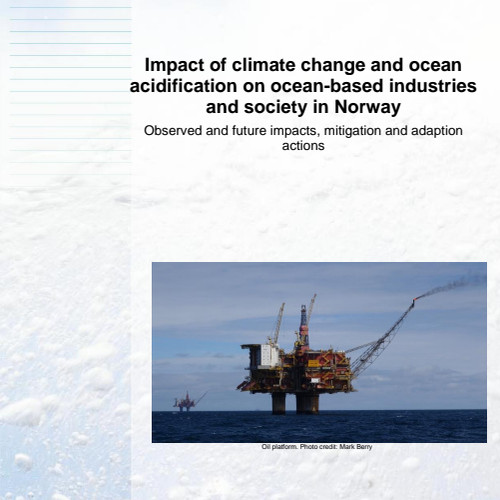12 February 2020 news
A new report presents the main challenges for sustainable development of ocean resources in the coming years based on research on the effects of climate change and ocean acidification on ocean ecosystems. The report highlights actions that could be taken by industries and society to help mitigate and reduce impacts.
Currently, Norway’s ocean-based industries, primarily seafood, shipping, offshore oil and gas are a major employer and accounts for almost 70 percent of Norwegian export revenues. Norway’s reliance on ocean resources is projected to increase through growth and diversification of its ocean-based industries. New industries that are emerging include marine biotechnology, lower trophic level harvesting, biochemicals, bioprospecting, offshore wind, seabed minerals and harvesting and production of new marine species.
The new ocean strategy report “Blå muligheter”, identifies climate change as a key challenge for the continued sustainable development of Norway’s ocean-based industries. Akvaplan-niva was commissioned by the Norwegian Environment Agency to synthesize and assess the latest scientific facts on this key challenge. This week, Akvaplan-niva Senior Scientist, Dr. Maj Arnberg presented the findings in Oslo at the Norwegian Environment Agency, highlighting the effects of climate change and ocean acidification on marine ecosystems and ocean-based industries in Norway.
“Climate change and ocean acidification are already affecting ocean-based industries in Norway”, says Dr. Maj Arnberg, lead author of the report. She continues, “the severity of future impacts and their consequences for Norway’s ocean industry sector and society will depend on the magnitude of greenhouse gas emissions in the years to come.”
“Our understanding of the impact from climate change and ocean acidification on the ocean and marine ecosystems is increasing rapidly”, says co-author Dr. Sam Dupont from the University of Gothenburg, “however, to ensure a sustainable development and avoid risks associated with Norway’s blue ocean strategy, there is a need for a more solid scientific knowledge base on impacts from human activities on the ocean and how to develop and implement mitigating and adaptive solutions.”
Ocean-based actions can mitigate and reduce the magnitude of climate change impacts, ocean acidification and other environmental challenges. A main conclusion of the report is that further investments in local, regional, and global ocean research, monitoring, and observing systems are needed today. These investments will provide the foundation for detailed evaluations of the costs, benefits and suitability of different governance options and for science-based decision making.
Akvaplan-niva applies research and technical innovation to decision support, securing economic value and safe environmental operations for businesses, authorities, and other clients worldwide. Akvaplan-niva's research and innovation programs are financed through competitive grants from government research agencies, public non-profit entities and from private companies. Our programs include supervision of Ph.D. and Master's level students and training of early career scientists. Our results are presented in peer-reviewed scientific journals and contribute to national and international assessment efforts.
The project was financed by the Norwegian Environment Agency and led by Maj Arnberg, Akvaplan-niva.
Report: https://www.mynewsdesk.com/no/...
Report also downloadable below.

